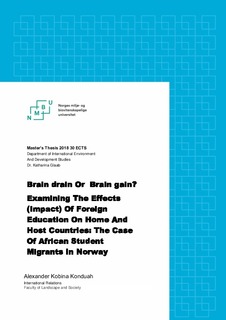| dc.description.abstract | The growing rate at which educated Africans are migrating (brain drain) to the developed world has gathered much attention among scholars. The thesis drifts away from the macro level analysis to examine the micro level with foreign education as a prime focus for discussion. The study attempts to explore how foreign education influence the brain drain or gain processes. The phenomenon in the African context is not purely based on economic reasons; it extends beyond a remittance which is often related to economic.
There are other factors that influence brain drain or gain phenomenon in the African context. The Study examines the preference (stay or return) of African students (living in Norway) ‘after completion of studies and what factors drives these preferences. The push-pull theory serves as the main theoretical point of discussion. Qualitative research approach design was applied. Data were collected using the semi-structured interview guide approach. The study focused on African student migrants living in Norway, mostly higher education.
In order to understand how foreign education influence the brain drain or gain processes in the African context, it was significant to get an insight into students’ future plans after their studies and unveil the factors influencing this preferences. The results indicate that most students choose to study in Norway not because of financial gains, but some pull factors such as: free education and scholarship packages, scholarly and intellectual autonomy, extensive resource for research, employment opportunities, greater income and higher wages as well as international exposure; as such, some push factors such as socio-cultural challenges, lack of research facilities, quality of education and political instability were central to their decision to seek foreign education. As for prospects after their studies, students are aware of the benefits they stand to gain if they succeed to find a job in Norway. Further, the study reveals the following factors that influence their preferences: socio-cultural freedom, social ties, social status, and international work experience, employment, quality of education, wages befitting qualification and political stability; hence the decision of students to either stay or leave, based on the studies is grounded essentially on the above mentioned factors, self-estimation of their skills as well as abilities | nb_NO |

